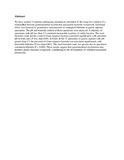Gastroduodenal dysfunction as a cause of gastric bacterial overgrowth in patients undergoing mechanical ventilation of the lungs.

View/
Date
1992Author
Inglis, TJ
Sproat, LJ
Sherratt, MJ
Hawkey, PM
Gibson, JS
Shah, MV
Type
ArticleLanguage
enMetadata
Show full item recordAbstract
We have studied 15 patients undergoing mechanical ventilation of the lungs for evidence of a relationship between gastroduodenal dysfunction and gastric bacterial overgrowth. Duodenal reflux was detected by quantitative measurement of conjugated bilirubin in gastric aspirate specimens. The pH and bacterial content of these specimens were analysed. A minority of specimens with pH less than 3.5 contained measurable numbers of viable bacteria. The total bacterial count and the count of Gram negative bacteria correlated significantly with specimen pH in both cases (P less than 0.001, in both). In the 72 specimens of gastric aspirate with pH greater than 3.5, the presence of Gram negative bacteria was associated significantly with detectable bilirubin (P less than 0.001). The total bacterial count was greater also in specimens containing bilirubin (P = 0.009). These results suggest that gastroduodenal dysfunction may promote gastric bacterial overgrowth, contributing to the development of ventilator-associated pneumonia.
URI
www.ncbi.nlm.nih.gov/whalecom0/pubmed/1642939http://erepository.uonbi.ac.ke:8080/xmlui/handle/123456789/30897
Citation
Br J Anaesth. 1992 May;68(5):499-502.Publisher
Department of Microbiology, University of Leeds, West Yorkshire.
Collections
- Faculty of Health Sciences (FHS) [10378]
